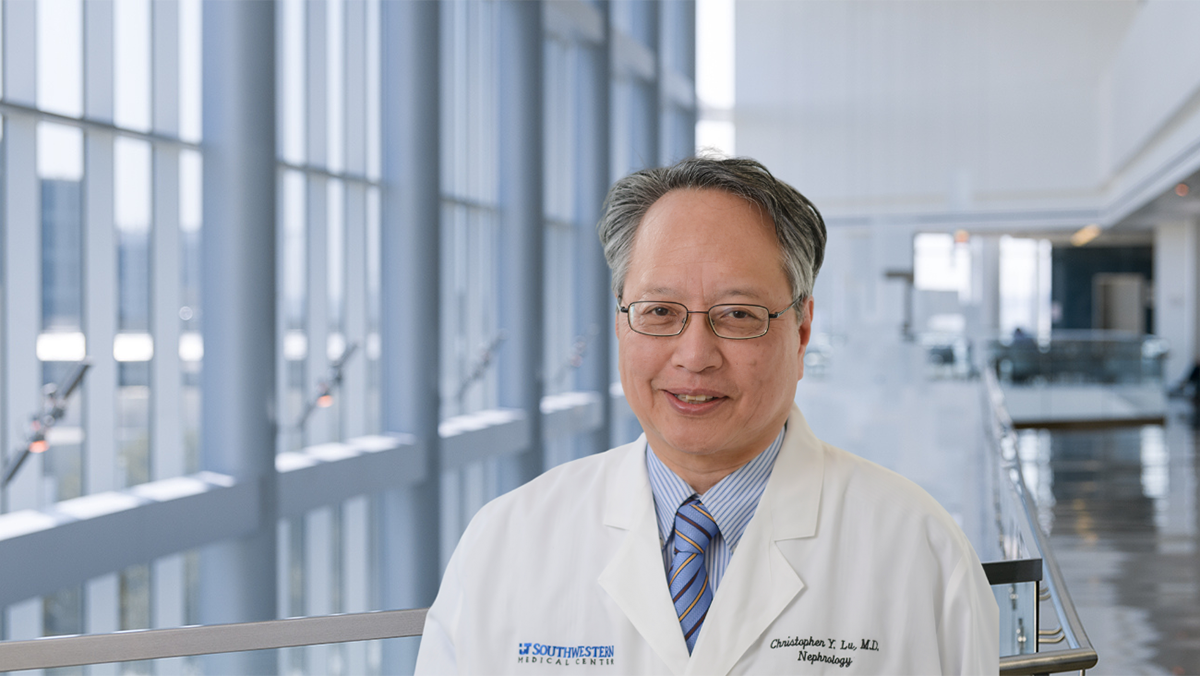- American Society of Transplantation
- American Society of Nephrology
- American Association of Immunologists

Christopher Lu, M.D.
- Internal Medicine - Nephrology
- Kidney Disease (Nephrology)
New Patient Appointment Accepting Virtual Visits or 214-645-1919
Biography
Christopher Lu, M.D., is a Professor in UT Southwestern Medical Center's Department of Nephrology and Medical Director of the Renal Transplant Program at Parkland Hospital.
Dr. Lu earned his medical degree at Harvard Medical School, and he completed his internship and residency in internal medicine at the Bronx Municipal Hospital Center. He then received advanced training in pathology and nephrology through fellowships at Harvard Medical School and Peter Bent Brigham Hospital (now Brigham & Women’s Hospital).
After working as a member of the Harvard Medical School faculty for eight years, he joined the UT Southwestern faculty in 1989.
Dr. Lu is a member of the American Association of Immunologists, the American Society of Nephrology, and the American Society of Transplantation.
Meet Dr. Lu
Kidney Disease and Transplant Specialist in Dallas
Christopher Lu, M.D., a kidney disease and transplant specialist at UT Southwestern Medical Center, has more than 30 years of experience in both kidney disease research and treatment. He treats adult patients who are dealing with a variety of kidney problems, including those with acute renal failure and chronic kidney disease, and patients needing kidney transplants or dialysis.
Dr. Lu is proud to be part of one of the nation’s most successful kidney transplant programs, with one-year renal graft survival rates above 94 percent. As in other areas of UT Southwestern, the nephrology department has a robust research program, allowing patients to continually benefit from the latest medical knowledge and techniques.
“Being at UT Southwestern is like being part of a talented orchestra,” he says. “The whole goal here is to be able to get patients what they need. We have a lot of resources, and we work to get the patient to the right place, the right specialist, and the right treatment.”
A Passion for Research
Dr. Lu was drawn to the field of nephrology through his passion for medical research. Today, he spends about half his time in the lab, focusing primarily on developing ways to stop or even reverse the progression of kidney disease.
“Once your kidney is injured, it tends to get worse,” he says. “That's one of our major problems now: Patients who have lost about 30 percent of their renal function from any cause, whether it's diabetes or hypertension, all tend to go on to require dialysis or transplant. We can slow that process, but we can't stop or reverse it. We're trying to figure out why that is, to see if we can do better.”
To help make that goal a reality, UT Southwestern is part of a new National Institutes of Health initiative called the Kidney Precision Medicine Program. This initiative involves a small number of select academic centers, including UT Southwestern. The goal is to use modern techniques, including genetics, to individualize therapy for each patient with renal disease. Dr. Miguel Vazquez is leading this effort at UT Southwestern. Working with physicians like Dr. Lu, the program seeks to promote the early identification of kidney disease in order to provide better treatment for patients.
“This is the initiative I'm most excited about because it's the newest and probably biggest program of its kind,” Dr. Lu says.
Translating Research Into Practical Treatment
The key, Dr. Lu explains, will lie in effectively translating clinical research into practical treatment for real-life patients.
“When it comes to the progression of kidney disease, the good news is that clinical researchers have clearly defined the problem,” he says. “For example, in my lab, I can cure chronic kidney disease in mice. The challenge is to bring that cure to the bedside in a safe way.”
However, thanks to the medical community’s growing focus on the need to slow or reverse the progression of kidney disease, Dr. Lu is confident there will be significant progress in the coming years.
“There are a lot of things that are working well in the lab right now,” he says. “I'm very optimistic about the future of patients with chronic kidney disease. It's going to get better.”
Education & Training
- Fellowship - Harvard Medical School (1980-1981), Nephrology
- Fellowship - Harvard Medical School (1977-1980), Pathology
- Residency - Bronx Municipal Hospital Center (1975-1977), Internal Medicine
- Internship - Bronx Municipal Hospital Center (1974-1975), Internal Medicine
- Medical School - Harvard Medical School (1970-1974)
Professional Associations & Affiliations
Honors & Awards
- Fellow, American Society of Nephrology
- Phi Beta Kappa 1969
- NIH Research Career Devel Award 1989
- Chairman 1996, Kidney/ Pancreas Committee, Am Soc Transplant Phys
- President 2008, Texas Transplantation Society
- Permanent Member 2010, NIH Pathobiol Kidney Dis Initial Rev Grp 2006-2010
- Fellow 2010, American Society of Nephrology
- invited lecturer 2011, US Food and Drug Agency (FDA) symposium on therapy of acute kidney injury
- Invited lecturer 2011, Symposium on Endothelium in Acute Kidney Injury, Annual Meeting of the American Society of Nephrology
Books & Publications
-
Books
-
Ch 88: The inflammatory response to ischemic acute renal injury in Seldin and Giebisch's The Kidney: Physiology and Pathophysiology
Lu, Christopher Y. (2013), London, Elsevier
-
Ch 88: The inflammatory response to ischemic acute renal injury in Seldin and Giebisch's The Kidney: Physiology and Pathophysiology
-
Publications
-
Acute kidney injury: a conspiracy of Toll-like receptor 4 on endothelia, leukocytes, and tubules.
Lu CY, Winterberg PD, Chen J, Hartono JR Pediatric nephrology (Berlin, Germany) 2012 Oct 27 10 1847-54 -
Acute kidney injury: the beginning of the end of the dark ages.
Winterberg PD, Lu CY The American journal of the medical sciences 2012 Oct 344 4 318-25 -
The inflammatory response to ischemic acute kidney injury: a result of the ?right stuff? in the ?wrong place.?
Lu, C.Y., J Hartono, M. Senitko, J. Chen. Current Opinion in Nephrology & Hypertension 2007 16 (2) 72-89 -
Perspectives in basic science: Hypothesis: is renal allograft rejection initiated by the response to injury sustained during the transplant process?
Lu, C.Y., Penfield, J.G., Kielar, M.L., Vazquez, M.A., Jeyarajah, D.R Kidney International 1999 55 2157-2168
-
Acute kidney injury: a conspiracy of Toll-like receptor 4 on endothelia, leukocytes, and tubules.
Research
- transplant rejection
- acute kidney injury (acute renal failure)
Clinical Focus
- Kidney Disease (Nephrology)
Q&A by Dr. Lu
Results: 1 Locations
Kidney & Liver Disease Clinic - Hepatology (Liver)
at Professional Office Building 2 5939 Harry Hines Blvd., 7th Floor, Suite 700Dallas, Texas 75390 214-645-1919 Directions to Kidney & Liver Disease Clinic - Hepatology (Liver) at Professional Office Building 2, Dallas Parking Info for Kidney & Liver Disease Clinic - Hepatology (Liver)
New Patient Appointment Accepting Virtual Visits or 214-645-1919

